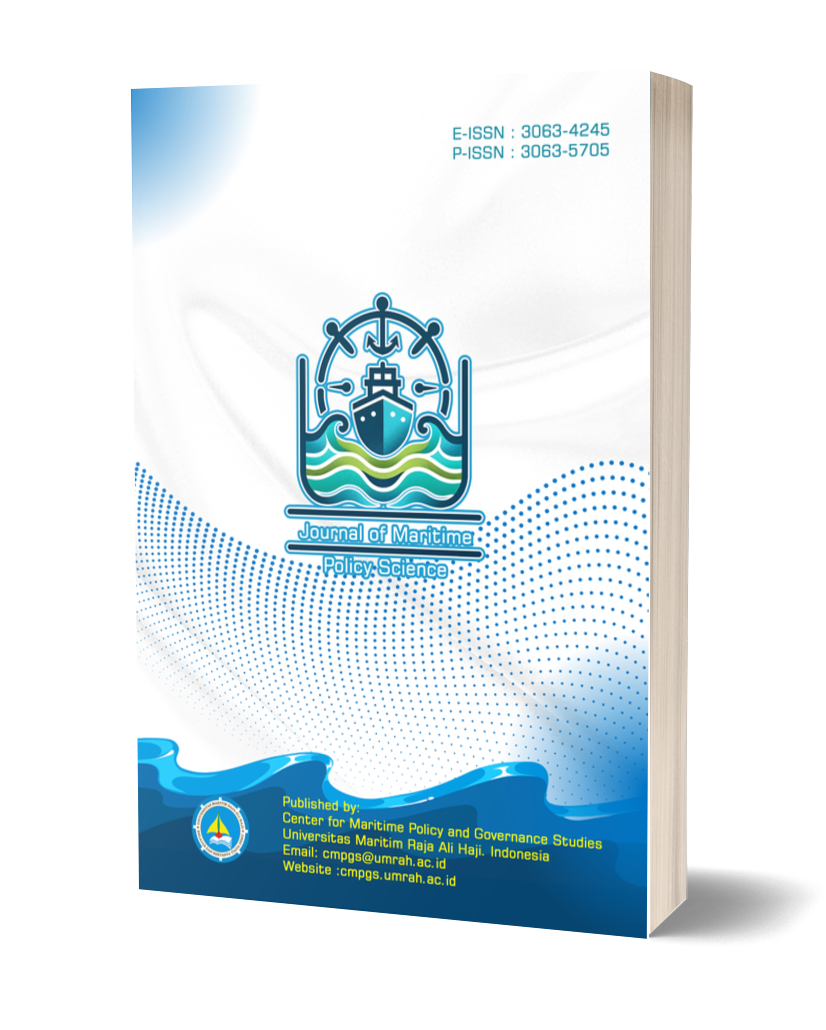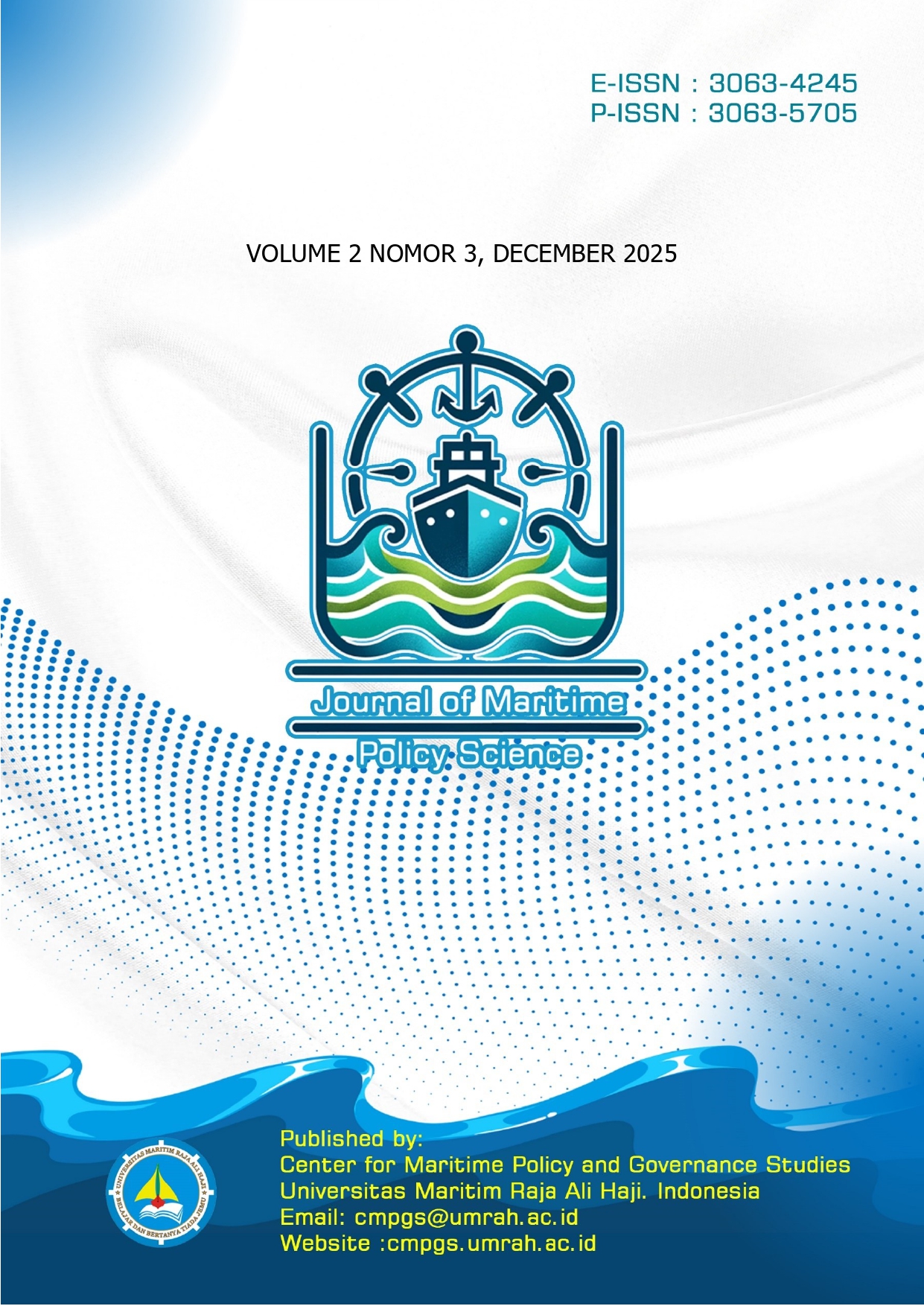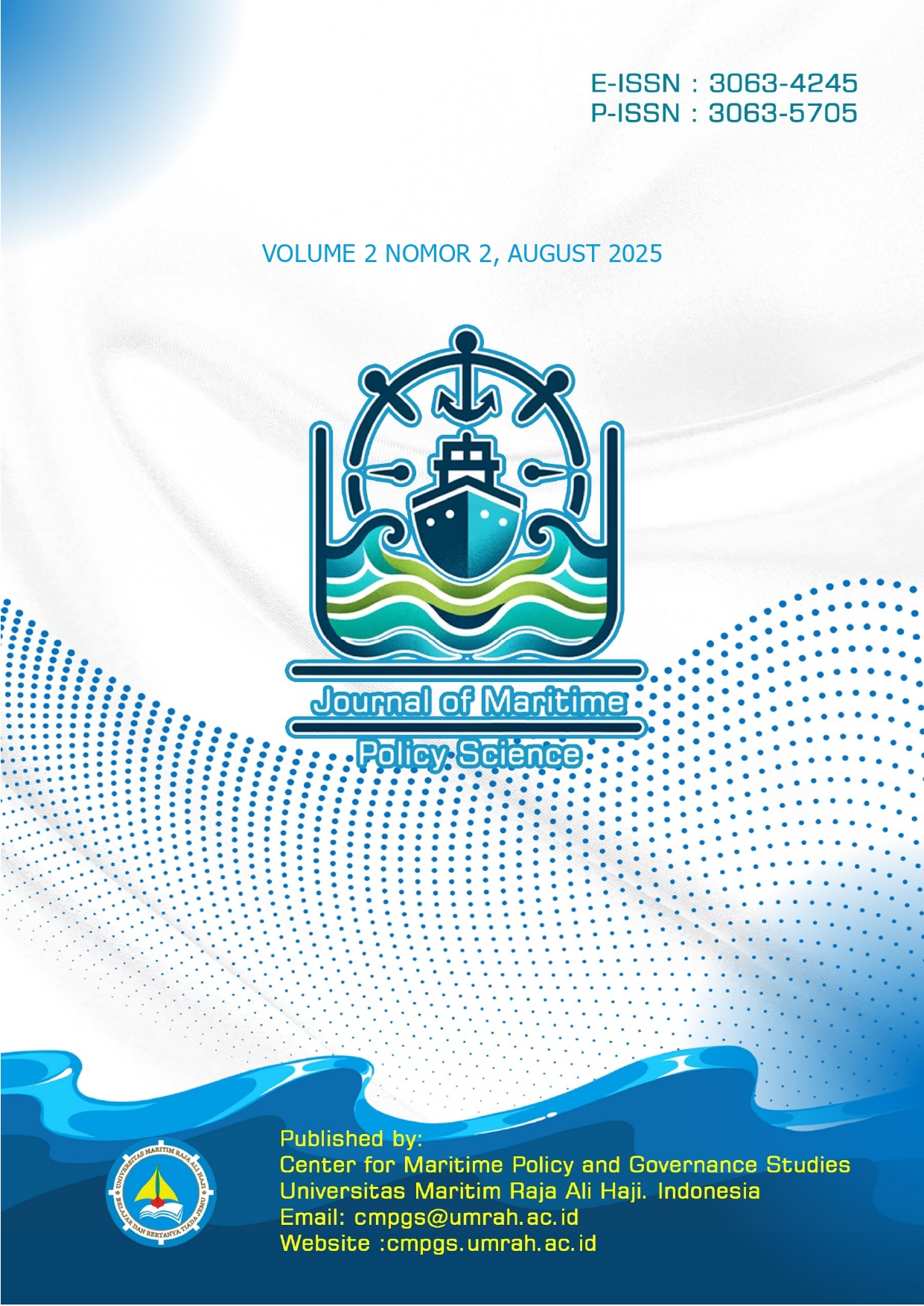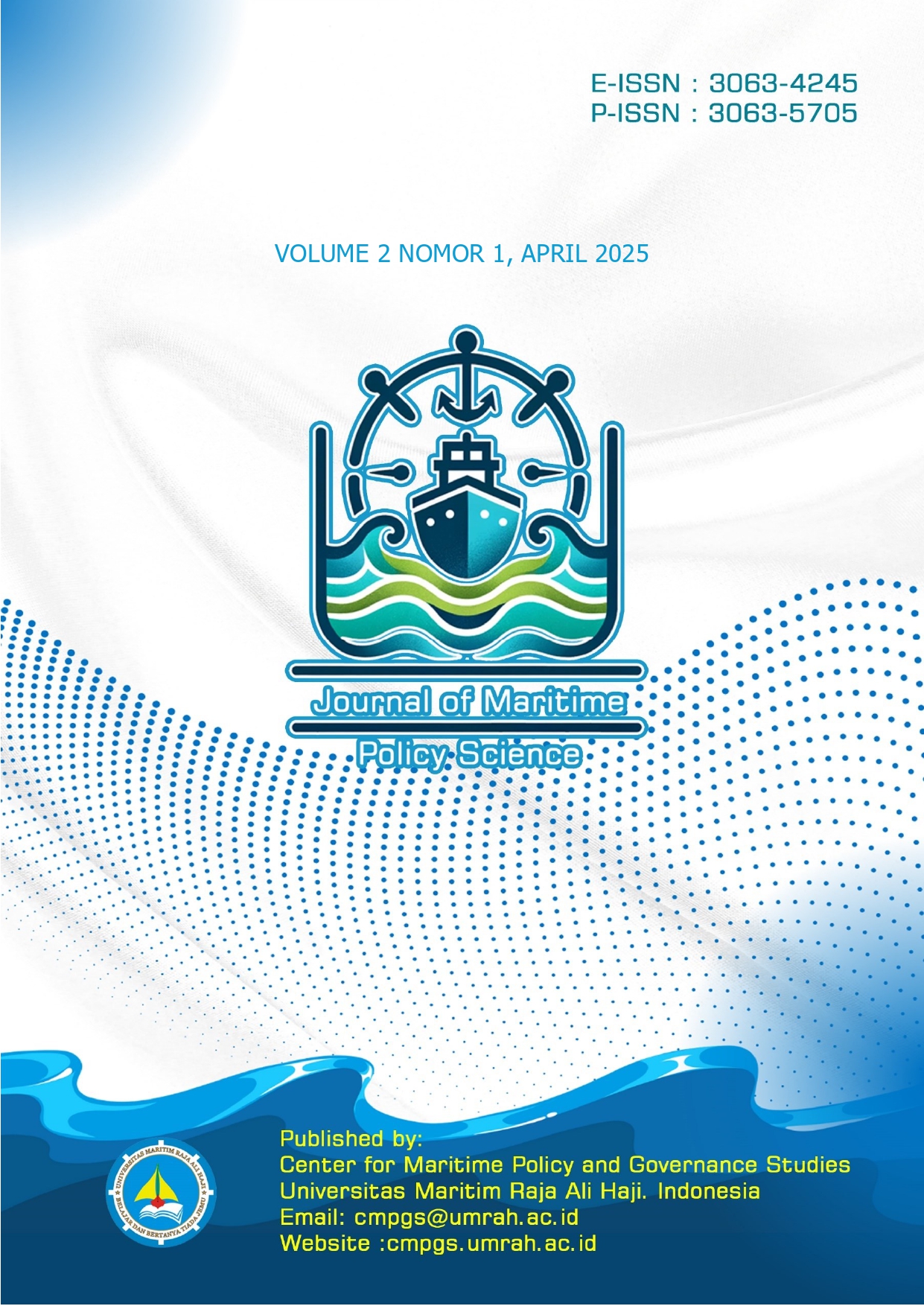COVER JOURNAL

TABLE OF CONTENT
TOOLS
CITATION ANALYSIS
ISSN BARCODE


VISITOR
IN COORPORATION WITH



The first article, The Application of Shipping Governance in the Management of Small E-Pas Outlet in Pangkil Village, Bintan Regency, explores how principles of shipping governance can be applied to strengthen the management of small-scale maritime service outlets in Pangkil Village. The authors highlight the relevance of institutional arrangements, service procedures, and local operational capacity in supporting more accountable and efficient maritime-related services at the village level. The second article, Philosophical Risk Transformation: A Systematic Review From Protection to Radical Adaptation in Indonesian Coastal Ontology, examines how the understanding of coastal risk in Indonesia has shifted conceptually from a protection-oriented approach toward more transformative and adaptive thinking. Through a systematic review, the study maps key ideas and debates that shape how coastal communities and policymakers frame vulnerability, resilience, and long-term adaptation. The third article, Optimizing of Integrated Port Infrastructure Design to Improve Maritime Logistics Efficiency in Eastern Indonesia, discusses strategies for improving logistics performance by optimizing integrated port infrastructure planning in Eastern Indonesia. The paper emphasizes the importance of coordination across port components, connectivity, and design efficiency to reduce bottlenecks and strengthen regional maritime supply chains. The fourth article, A 30 - Year Climatological Analysis of Atmospheric Dynamics Anomalies during CENS in Western Indonesia, presents a long-term climatological assessment of atmospheric dynamics anomalies associated with CENS over Western Indonesia. The authors underline how multi decadal analysis can support better climate understanding and provide a foundation for improved environmental planning and risk awareness. The final article, Evaluation of Compliance with IMO FAL Regulations in International Shipping Standards: A Comparative Study between Indonesia and Singapore, evaluates the extent of compliance with IMO FAL regulations by comparing practices and standards between Indonesia and Singapore. The study draws attention to administrative facilitation, documentation procedures, and harmonization challenges that influence the efficiency of international shipping operations.
Enjoy Reading!!

The first article, Revitalization of Marine Culture Through Maritime Based Development Policy in Indonesia, explores how Indonesia’s maritime development policies can serve as a vehicle for reviving traditional marine culture. The authors emphasize the importance of integrating cultural heritage, local wisdom, and modern governance frameworks to strengthen maritime identity and community participation in coastal development. The second article, Formation of Strategic Provinces on Maritime Borders: A Political Economy Analysis of Natuna-Anambas Proposal, examines the proposal to form a new strategic province in Indonesia’s maritime border region. Through a political economy lens, the paper analyzes the geopolitical, administrative, and economic considerations behind the Natuna–Anambas initiative, highlighting its potential to enhance national security and regional equity. The third article, Opportunities and Challenges for Local Governments in Increasing Local Revenues through Fisheries Trade System Reform Marine Capture in Bintan Regency, investigates the potential of fisheries trade reform as a local revenue strategy. The study discusses how market efficiency, governance reforms, and policy innovations can improve the performance of Bintan’s marine capture fisheries while supporting sustainable livelihoods. The fourth article, Public Management Model in Marine Pollution Control: A Case Study of Bintan Regency, evaluates the effectiveness of public management approaches in addressing marine pollution. The authors present a case study from Bintan Regency to assess institutional coordination, enforcement mechanisms, and community engagement in marine environmental governance. The final article, Maritime Security and Drug Threats in the Border Waters of Bintan Regency: The Perspective of the Bintan Resort Police, offers a law enforcement perspective on maritime security challenges. It highlights the growing threats of drug trafficking in border waters and examines the strategic responses and interagency coordination efforts led by the Bintan Resort Police.
Enjoy Reading!!

The first article, Distribution of Subsidized Fuel for Fishermen in The Utilization of Maritime Potential in Bintan Regency, examines the allocation of subsidized fuel to local fishermen and its impact on optimizing maritime potential in Bintan Regency, emphasizing the role of regional support in sustaining the fishing economy. The second article, Regional Policy Diversification to Maximize Blue Economy Potential in Kepulauan Riau Amid Indonesia-China Bilateral Cooperation, explores the development of regional policies to strengthen the blue economy in Kepulauan Riau, particularly in the context of growing bilateral relations between Indonesia and China. The third article, Coral Reef Bleaching Crisis: Impacts on Indonesia's Marine Ecosystems and Coastal Economy, discusses the ecological and economic consequences of coral reef bleaching in Indonesia, highlighting the urgent need for sustainable marine conservation strategies. The fourth article, Maritime Paradiplomacy of the 15th-Century Malay Sultanate: An Inspirational Model for Contemporary Archipelagic Regional Autonomy in Indonesia, revisits the maritime diplomacy practices of the historical Malay Sultanate, offering insights for strengthening modern regional autonomy in Indonesia’s archipelagic provinces. The final article, Government Paradiplomacy in Proposing Penyengat Island to UNESCO as a World Cultural Heritage, presents a case study on how local government diplomacy efforts are being mobilized to propose Penyengat Island as a UNESCO World Heritage Site, underscoring the intersection of culture and international recognition.
Enjoy Reading!!

The first article, Optimization of Human Resources (HR) to Support Blue Economy in Riau Island, explores strategies to optimize human resources as a key driver in supporting the blue economy in Riau Islands Province. The paper highlights the importance of human capital development, focusing on the enhancement of skills, innovation, and productivity in sectors like fisheries, tourism, and maritime industries to achieve sustainable economic growth in the region. The second article, Implementation of the Measured Fishing Policy (Penangkapan Ikan Terukur - PIT) in the Riau Islands Province, examines the application of the Measured Fishing Policy in Riau Islands Province. The paper discusses how this policy promotes sustainable fishing practices by regulating fishing activities, ensuring resource preservation, and balancing economic and ecological interests within the maritime sector. The third article, Role of Maritime Public Policy on The Economic Development of Coastal Communities in The Tanjungpinang City Area investigates the impact of maritime public policies on the economic development of coastal communities in Tanjungpinang City. The study emphasizes the role of government initiatives, infrastructure development, and community engagement in fostering economic growth and improving the livelihoods of coastal populations. The fourth article, Pa'boya: The Adaptation Of Coastal Communities In South Sulawesi To Maritime Migration Policies In Southeast Asia, focuses on the cultural adaptation of coastal communities in South Sulawesi in response to maritime migration policies in Southeast Asia. The paper analyzes how these communities navigate policy changes while maintaining traditional practices and exploring opportunities for socio-economic resilience in a dynamic maritime region. The final article, Redefining Paradiplomacy Strategy to Strengthen Island Governance Autonomy: The Case of Riau Islands, Indonesia, delves into the role of paradiplomacy in enhancing island governance autonomy in Riau Islands Province. The study highlights strategic approaches to engage in international collaborations, strengthen local governance, and assert the province's role in regional and global maritime diplomacy.
Enjoy Reading!!

The first article, KADO SPESIAL: Strategic Innovation for Conservation Area Management in Pieh Island National Marine Protected Area, West Sumatra. Focuses on innovative strategies for managing conservation areas within the Pieh Island National Marine Protected Area. The paper discusses the importance of integrating strategic innovations to balance conservation efforts with sustainable development, highlighting the role of local communities, government, and technology in protecting marine biodiversity while promoting eco-friendly tourism. The second article, Galang Batang SEZ Advancing the Blue Economy through Strategic Development, examines the development of the Galang Batang Special Economic Zone (SEZ) as a driving force for Indonesia's blue economy. The paper analyzes how strategic infrastructure and policy initiatives within the SEZ contribute to sustainable economic growth, particularly in maritime industries like fisheries, aquaculture, and ocean-based tourism. The third article, Exploring Technological Innovation in Wave Forecasting Using Machine Learning: A Literature Analysis, reviews the use of machine learning technologies in improving wave forecasting models. This paper explores the potential of artificial intelligence and data-driven approaches to enhance the accuracy of wave predictions, which are critical for maritime safety, coastal management, and the shipping industry. The fourth article, Stakeholder Analysis of Indonesia's Trade in the Regional Comprehensive Economic Partnership (RCEP) with Non-ASEAN Actors, offers a comprehensive analysis of Indonesia’s trade relationships within the framework of the Regional Comprehensive Economic Partnership (RCEP), focusing on non-ASEAN stakeholders. The study identifies key players, trade dynamics, and challenges in engaging with non-ASEAN countries, emphasizing the need for strategic trade policies and collaboration to maximize Indonesia's benefits from the RCEP agreement. The final article, Nation Branding of Kepulauan Riau Through Subregional Cooperation in The Indonesia-Malaysia-Thailand Growth Triangle (IMT-GT), explores how the Riau Islands Province is enhancing its international image through its involvement in the IMT-GT subregional cooperation. The paper highlights the province’s efforts to position itself as a key player in economic growth, tourism, and cultural exchange in the subregion.
Enjoy Reading!!

The first article, Digital Transformation in the Maritime Industry: Opportunities and Challenges for Indonesia, The maritime industry is undergoing significant digital transformation, driven by technological advancements and changing global trends. The second article, The Role of Regional Government and Implementation of Environmental Management in Managing Tidal Floods in Bintan Regency, This study assesses the effectiveness of environmental management in mitigating floods in Bintan Regency, Indonesia. The third article, Application of the Public-Private Partnership Concept in Airport Development in Bintan Regency to Improve the Economy of Coastal Areas, This paper explores the potential of public-private partnerships (PPPs) in developing airports in Bintan Regency, Indonesia. The fourth article, Enhancing Maritime Security: Challenges and Strategies in Indonesia's Natuna Sea, The Natuna Sea is a critical maritime route with significant economic and strategic importance. This paper identifies the challenges facing maritime security in the region, including piracy, terrorism, and environmental threats. The final article, Unraveling the Maintenance of Southeast Asia Maritime Security: A Look into the ASEAN Maritime Outlook, This study provides an overview of maritime security issues in Southeast Asia, highlighting the complexities and challenges faced by regional countries.
Enjoy Reading!!
Journal of Maritime Policy Science This work is licensed under
a Creative Commons Attribution-ShareAlike 4.0 International License![]()
Published by:
Center for Maritime Policy and Governance Studies. Universitas Maritim Raja Ali Haji. Indonesia
Email: cmpgs@umrah.ac.id | Website: cmpgs.umrah.ac.id
